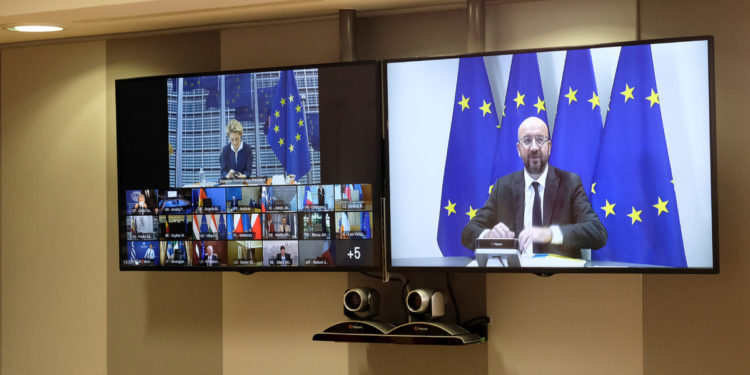No breakthrough on recovery package in spite of four hours of negotiations
The European Commission put forward a proposal on May 27 for a 1.85 trillion-euro ($2.07 trillion) recovery fund, known as Next Generation EU. It includes 750 billion euros to be raised from the financial market and 1.1 trillion euros from its 2021-27 long-term budget. Of the 750 billion euros raised, 500 billion euros are expected to be distributed as grants and 250 billion euros as loans.
After about four hours of discussions via videoconference on Friday, leaders of the EU’s 27 member states did not make breakthroughs on key differences.
European Council President Charles Michel tried to sound a positive note. “It was the occasion to observe that on different points there is an emerging consensus, which is very positive,” he told a news conference after the meeting.
“But at the same time, we don’t underestimate the difficulties,” said Michel, a former Belgian prime minister, adding that he is totally committed to start immediately real negotiations with the member states.
He expects a physical summit for the leaders in Brussels in mid-July.
European Commission President Ursula von der Leyen said it is essential that leaders lose no time in putting their economic and social recovery on a firm footing.
She emphasized that the Next Generation EU will provide the necessary means and the proper focus on a green, a digital and a resilient recovery to help the EU, its citizens and its businesses to emerge stronger from the crisis. The EU aims to become the first carbon neutral continent by 2050 under its Green Deal.
Von der Leyen said there were differences on various issues during the discussions on Friday, including the overall size of Next Generation EU, the balance between grants and loans, allocation criteria and on own new resources and rebates.
“I am sure that on these points we can reach a consensus, provided that we do not lose sight of the big picture,” she said.
Germany, France, Italy and Spain, the EU’s four biggest economies, have supported the plan. Italy and Spain, which are among the major beneficiaries of the recovery fund, expect more grants and fewer loans. But the so-called Frugal Four, comprising the Netherlands, Austria, Denmark and Sweden, want fewer grants and more loans and oppose issuing too much common debt to support those hardest-hit member states.
“We are ready to help those countries most affected by COVID-19, but the assistance has to be well targeted and clearly limited in time,” Austrian Prime Minister Sebastian Kurz said in a tweet after the meeting.
The recovery fund needs to be firmly anchored in the reform process and support the green and digital transitions, he said, adding that the Frugal Four will coordinate their position.
Difficult times
German Chancellor Angela Merkel, who was supportive of the recovery package, told the virtual meeting that Europe faced “very, very difficult times” and mused on whether the gravity of the situation was truly understood, the Guardian newspaper reported.
European Parliament President David Sassoli on Friday called the recovery package ambitious, but added: “In our view it only scratches the surface of what needs to be done.”
EU member states, most of which have reopened their internal borders, were hit hard by COVID-19 from March to May. More than 125,000 people have died of COVID-19 across the EU.
The European Commission has predicted that EU economies will shrink by 7.4 percent this year, but “both the depth of the recession and the strength of the recovery will be uneven” for member states.









